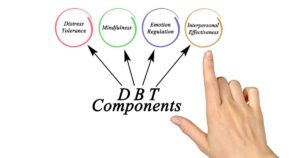
Dialectical Behavior Therapy for mental health is a specialized form of cognitive-behavioral therapy designed to help individuals manage emotions and improve relationships. Developed by Dr. Marsha Linehan, DBT combines mindfulness practices with distress tolerance, emotion regulation, and interpersonal effectiveness skills. DBT treatment aims to provide patients with tools to cope with and change unhelpful behaviors, particularly those associated with borderline personality disorder.
At American Treatment Network, we integrate dialectical behavior therapy into our customized healthcare approach, offering comprehensive support to address both physical and behavioral needs, especially for those battling opioid and alcohol addiction.

Core Components of DBT
Dialectical behavior therapy is built on four core components that collectively help individuals manage and overcome emotional challenges.
Mindfulness
Mindfulness is the foundation of DBT for mental health, teaching patients to be present in the moment, enhancing self-awareness, and reducing reactive behaviors. By practicing mindfulness, individuals learn to observe their thoughts and feelings without judgment, fostering a calmer and more focused state of mind.
Distress Tolerance
Distress tolerance involves developing skills to cope with and tolerate distressing situations without resorting to harmful behaviors. This component provides practical strategies for managing crises, such as self-soothing techniques and distraction methods, helping individuals navigate through difficult times with resilience.
Emotion Regulation
Emotion regulation focuses on understanding and managing intense emotions that can lead to impulsive actions. Through emotion regulation, patients learn to identify and label their emotions, reduce vulnerability to emotional dysregulation, and apply techniques to shift negative emotional states, promoting a more balanced and stable emotional life.
Interpersonal Effectiveness
Interpersonal effectiveness equips individuals with the skills to communicate more effectively and assertively in their relationships. This component emphasizes the importance of maintaining self-respect, setting boundaries, and achieving personal goals while fostering healthy and constructive interactions with others.

Techniques and Strategies Used in DBT
Dialectical behavior therapy employs a variety of techniques and strategies designed to help individuals develop skills for better managing their emotions and behaviors.
Skills Training
One of the primary DBT techniques is skills training, where patients learn and practice new skills in a structured setting. Skills training typically focuses on the four core components: mindfulness, distress tolerance, emotion regulation, and interpersonal effectiveness.
Individual Therapy
DBT therapy methods also include individual therapy, where patients work one-on-one with a therapist to address personal challenges and apply DBT skills to real-life situations. These sessions are crucial for tailoring the treatment to the individual’s specific needs, ensuring that they receive the personalized support necessary for their recovery.
Phone Coaching
Another innovative aspect of DBT treatment is phone coaching, which provides patients with immediate support and guidance outside of scheduled therapy sessions. This method allows individuals to contact their therapist during moments of crisis or when they need help applying DBT skills in real-time, enhancing their ability to manage stressful situations effectively.
Group Therapy Sessions
Group therapy sessions are another integral component of DBT, offering patients a supportive environment to practice and reinforce their skills alongside others facing similar challenges. These sessions not only build a sense of community but also provide opportunities for individuals to learn from each other’s experiences and support one another in their recovery journey.
Benefits of DBT
Dialectical behavior therapy offers numerous benefits for individuals struggling with emotional and behavioral issues. Here are some key benefits of DBT:
Effective in Treating Borderline Personality Disorder
One of the primary dialectical behavior therapy benefits is its effectiveness in treating borderline personality disorder (BPD). DBT was specifically developed to address the intense emotional swings, impulsive behaviors, and unstable relationships that characterize BPD. Research has shown that individuals undergoing DBT experience significant reductions in suicidal behavior, self-harm, and hospitalization rates.
Helps Manage Emotions and Reduce Self-Destructive Behaviors
Another crucial benefit of DBT is its ability to help individuals manage emotions and reduce self-destructive behaviors. Through the core components of DBT—mindfulness, distress tolerance, emotion regulation, and interpersonal effectiveness—patients learn to cope with intense emotions in healthier ways. This comprehensive approach empowers individuals to break the cycle of negative behaviors and make more positive choices, leading to improved overall mental health.
Enhances Interpersonal Relationships
DBT also enhances interpersonal relationships by teaching individuals effective communication and conflict-resolution skills. The interpersonal effectiveness component of DBT equips patients with the tools to set boundaries, assert their needs, and maintain self-respect in relationships. As a result, individuals often experience more fulfilling and stable relationships, both personally and professionally.

Applications of DBT
Dialectical behavior therapy is a versatile therapeutic approach with a wide range of applications in mental health care.
Use in Treating Various Mental Health Conditions
DBT is widely recognized for its effectiveness in treating borderline personality disorder; however, its applications extend to other mental health conditions as well. Managing emotions with DBT is particularly beneficial for individuals dealing with depression, post-traumatic stress disorder (PTSD), and eating disorders. DBT’s structured approach helps patients develop coping mechanisms and emotional regulation skills that are crucial for overcoming these conditions.
DBT for Adolescents and Adults
DBT is adaptable for different age groups, making it suitable for both adolescents and adults. For adolescents, DBT addresses issues such as self-harm, suicidal ideation, and emotional dysregulation. It helps young individuals build resilience and improve their emotional and social functioning.
Adults benefit from DBT in managing a range of emotional and behavioral challenges, fostering better mental health and interpersonal relationships.
How to Find a DBT Therapist
Finding a qualified DBT therapist near you is crucial for effective DBT treatment. Start by researching therapists who specialize in dialectical behavior therapy and have proper certification and experience. Look for professionals who have completed specialized DBT training and have a track record of treating patients with conditions similar to yours.
In a typical DBT session, you can expect a structured approach focused on building specific skills such as mindfulness, distress tolerance, emotion regulation, and interpersonal effectiveness. These sessions may involve individual therapy, group skills training, and phone coaching for real-time support.
When interviewing potential therapists, consider asking the following questions:
- What is your experience with DBT?
- How long have you been practicing DBT?
- Can you describe your typical approach to DBT treatment?
- How do you tailor DBT to meet individual needs?
At American Treatment Network, we integrate DBT into our comprehensive healthcare approach, ensuring personalized support for your physical and behavioral health needs. Our skilled therapists are dedicated to helping you achieve lasting emotional well-being.
Discover how the American Treatment Network can support you in overcoming challenges and achieving a healthier, more fulfilling life.


